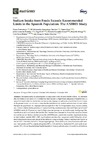Please use this identifier to cite or link to this item:
https://accedacris.ulpgc.es/jspui/handle/10553/70053
| Title: | Sodium intake from foods exceeds recommended limits in the spanish population: The ANIBES study | Authors: | Partearroyo, Teresa Samaniego-Vaesken, Ma de Lourdes Ruiz, Emma Aranceta Bartrina, Javier Gil, Ángel González-Gross, Marcela Ortega, Rosa M. Serra Majem, Luis Varela-Moreiras, Gregorio |
UNESCO Clasification: | 3206 Ciencias de la nutrición | Keywords: | Anibes Consumption Food Groups Intakes Salt, et al |
Issue Date: | 2019 | Journal: | Nutrients | Abstract: | Excessive sodium consumption is associated with adverse health effects. An elevated dietary intake of salt (sodium chloride) has been related to high blood pressure or hypertension, a major but modifiable risk factor for cardiovascular disease, as well as to other ill health conditions. In the present work, our aim was to describe the contribution of foods to sodium consumption within the Spanish population in a representative sample from the “anthropometric data, macronutrients and micronutrients intake, practice of physical activity, socioeconomic data and lifestyles in Spain” (ANIBES) study (9–75 years), to identify high consumer groups, as well as the major food groups that contribute to sodium intake in the Spanish diet. Intakes were assessed by 3-day food records collected on a tablet device. Sodium intakes across the ANIBES study population exceeded recommendations, as total intakes reached 2025 ± 805 mg of sodium per day, that is approximately 5.06 g/day of salt (excluding discretionary salt, added at the table or during cooking). Sodium intakes were higher in males than in females and within the youngest groups. Main dietary sources of sodium were meat and meat products (27%), cereals and grains (26%), milk and dairy products (14%) and ready-to-eat meals (13%). Given the established health benefits of dietary salt reduction, it would be advisable to continue and even improve the current national initiatives of awareness and educational campaigns and particularly food reformulation to decrease overall salt intakes across the Spanish population. | URI: | https://accedacris.ulpgc.es/handle/10553/70053 | ISSN: | 2072-6643 | DOI: | 10.3390/nu11102451 | Source: | Nutrients [ISSN 2072-6643], v. 11 (10), (Octubre 2019) |
| Appears in Collections: | Artículos |
SCOPUSTM
Citations
28
checked on Jun 8, 2025
WEB OF SCIENCETM
Citations
30
checked on Feb 22, 2026
Page view(s)
76
checked on Jan 11, 2026
Download(s)
74
checked on Jan 11, 2026
Google ScholarTM
Check
Altmetric
Share
Export metadata
Items in accedaCRIS are protected by copyright, with all rights reserved, unless otherwise indicated.
